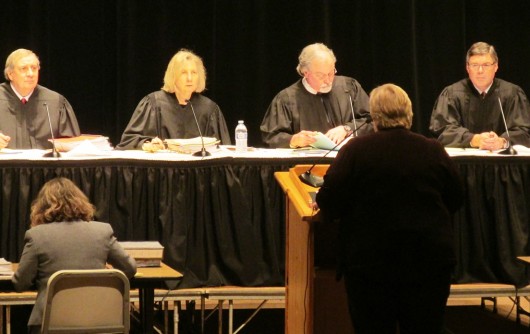
The Alaska Supreme Court listens to a state attorney during the Supreme Court live event in Ketchikan last fall. Alaska’s high court soon will consider an appeal from the state in Ketchikan’s lawsuit challenging Alaska’s required local contribution for public schools.
The State of Alaska announced Wednesday that it will appeal a final ruling by Superior Court Judge William Carey in favor of the Ketchikan Gateway Borough’s long-held argument that the state’s required local contribution for public education violates Alaska’s Constitution.
The state also will ask for a stay on Judge Carey’s ruling while the appeal is considered by the Alaska Supreme Court.
Kathryn Vogel is an Assistant Attorney General with the state Department of Law. She said, simply, that Judge Carey’s decision was wrong.
“The state believes that Alaska’s tradition of joint state and local school cooperation over public schools is constitutional,” she said.
In his decision, the judge ruled that municipalities should not be required to pay for public education because the required local contribution is essentially a tax earmarked for a special purpose. Carey said that is a violation of the Constitution.
Vogel said the state disagrees with Carey’s conclusion, because it’s not a state tax.
“Instead, it is locally raised money that goes directly to local schools,” she said. “The dedicated funds prohibition applies directly to state revenue, and that’s the biggest point of contention that the state has.”
Vogel adds that the prohibition on dedicated funds has a built-in exception for state-local cooperative programs.
“From the state’s perspective, public schools is a quintessential state-local cooperative program,” she said.
Borough Manager Dan Bockhorst said he’s heard all that before.
“The state argued that unsuccessfully in the court,” he said. “We disagreed, and the Superior Court disagreed with the state’s position, as well.”
Bockhorst said the state’s decision to appeal Judge Carey’s ruling was not unexpected.
“We’re certainly not surprised that the state plans to appeal, given the magnitude of the issue: Roughly $235 million annually statewide that is imposed on 34 municipal governments, two-thirds of the school districts in Alaska,” he said.
But, Bockhorst said, he is confident that the Supreme Court will uphold the lower court ruling.
“It is a charge levied by the state that is dedicated to a specific purpose, and that circumstance is prohibited by Alaska’s Constitution,” he said.
The Ketchikan Gateway Borough filed the lawsuit almost exactly a year ago, but borough officials have been talking about the issue for much longer. The issue has been litigated before without success, but those lawsuits focused on different arguments.
For example, the Mat-Su Borough many years ago sued the state, claiming that the required local contribution was unfair to municipal governments. While the current lawsuit didn’t bring those failed arguments back in front of the court, Bockhorst agrees that it is unfair, and adds that it’s just bad policy.
“It imposes, literally, over time, billions of dollars in burdens on 34 municipal governments in Alaska, and ignores one-third of Alaska school districts, without regard to their fiscal capacity,” he said.
Bockhorst said the policy also discourages new boroughs from forming, because people in unorganized parts of the state don’t want to be compelled to provide a specific amount for local schools.
Bockhorst adds that the lawsuit is not an attempt to get out of paying for education.
“We’re not opposed to local support for schools,” he said. “We want it to be done in a fashion that is fair and equitable, and imposes equal obligations on every Alaskan, not just those that live in municipal school districts.”
State attorneys plan to file their motion for a stay within a few days with Superior Court Judge William Carey. If he denies it, Vogel said they will file for a stay with the Alaska Supreme Court, which is where they’ll also file their appeal.
How long that appeal will take is unknown.
“There’s no fixed timeline for how long it will take the Supreme Court, but this is a case that is going to require robust briefing, so I anticipate it will be a few months to a year before we get a decision from the Alaska Supreme Court, if history is a guide,” Vogel said.
Bockhorst said the borough is ready to see the case through to the end, and has funds set aside for legal costs. Ketchikan’s Borough Assembly appropriated $400,000 for the lawsuit, and so far has spent only $150,000.
That’s a pretty good investment if the case ends up in the borough’s favor. Ketchikan’s required local contribution in 2014 was about $4.2 million. The borough did ask Judge Carey to make the state refund that money, but that part of the lawsuit was denied.
UPDATE: Wednesday afternoon, the state filed its appeal and the motion for a stay. A decision on the stay is pending.






